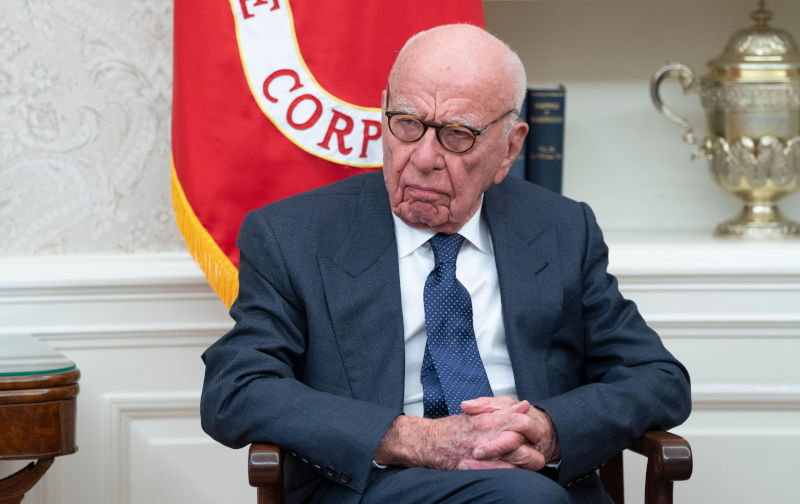Late last year, Rupert Murdoch launched an audacious effort to amend the terms of the “irrevocable” family trust he had set up in the wake of his divorce from his second wife, Anna.
He wanted to make sure his older son, Lachlan, would enjoy exclusive control over the Murdoch media empire once the pater familias shuffled off the mortal coil. The other three children with equal voting rights could not be trusted to endorse the far-right ideological bent of organs stretching from Australia and the UK to the US.
An effort in December 2023 to persuade his older daughters, Prudence and Elisabeth, to back the plot flopped badly. Rupert fainted the following morning, during breakfast with Rebekah Brooks, the head of his British operations. The family had been spooked earlier that year when the patriarch Roy Logan was killed off in the final season of HBO drama Succession, loosely based on the Murdoch saga. The apparent accuracy of some of its scenarios sparked speculation about who was briefing the scriptwriters. When Rupert divorced his fourth wife, Jerry Hall, via email in 2022, one of the stipulations of the settlement was that she would steer clear of the Succession producers.
Everyone knows, though, that facts can be stranger than fiction, and recent revelations have confirmed this proposition. The latest was James Murdoch’s interview with McCay Coppins for The Atlantic, in which Rupert’s younger son described his father as a misogynist, and claimed that during the Nevada court case last year Rupert had been texting hostile questions to his lawyer while James was on the witness stand. “Have you ever done anything successful on your own?” was among those questions, and James and his older sisters were also described by his dad’s attorney as “white, privileged, multi-billionaire trust fund babies”.
That may be a reasonably accurate description, but it loses some of its force when it comes from a source that routinely endorses white privilege and multi-billionaires. And, besides, doesn’t Lachlan fall into precisely the same category? To Rupert, he’s the only offspring who can guarantee the continuation of his extraordinarily toxic ideological legacy across three continents.
A couple of years ago, Rupert handed over the reins of Fox and News Corp to his elder son. But he never quite ceded complete control of the empire. As long as the nonagenarian media mogul remains sentient, he’s effectively guaranteed the right to control its direction. What might come next remains subject to feverish speculation, after the probate commissioner in Nevada pronounced his verdict last December, deciding that Rupert and Lachlan had acted in bad faith. His decision has been appealed, but a reversal appears unlikely.
What might follow Rupert’s demise will become clear only after the funeral rites. But no one can say how far away that might be. Over the past decade there have been several health scares, but he survived them all – and his mother lived to be 103. Likewise, a series of scandals and legal setbacks have bruised his empire without proving fatal. From revelations about Roger Ailes’ predatory inclinations and the phone hacking backlash in Britain more than a decade ago to the Dominion Voting Systems suit in the US following the 2020 presidential election, the stumbles have proved costly, but not insurmountable.
What’s remarkable in the context of the latter case is that heads rolled at Fox News after it became the first network to correctly declare Joe Biden the winner in Arizona. It immediately lost viewers to outlets even farther on the extreme right, and subsequently went all-in with the furphy of a stolen election. Dominion, unfairly accused of manipulating votes at the behest of Venezuelan interests, won nearly US$800 million in reparations. Perhaps what matters most is the sheer hypocrisy: not only was Rupert well aware that the “stolen election” narrative was a farce, but he actually attempted to dissuade Donald Trump from going down that road. When Trump demurred, Fox News followed him down the rabbit hole. It eventually cost star performer Tucker Carlson his job, but the second Trump administration is peppered with alumni from Trump’s favourite show, Fox & Friends, with defence secretary Pete Hegseth — accused of sexual misconduct, financial mismanagement and alcohol issues — at the top of the pile.
Rupert has been familiar with Donald for decades, and has frequently described him as an idiot or worse. His TV channel and newspapers advocated against Trump during the 2016 Republican primaries and convention. Once Trump won, though, he turned into the messiah. The deceit carries on. At his 2023 encounter with his oldest daughter, Prue, Rupert — reading from his talking points — emphasised his companies’ role as a “protector of the conservative voice in the English-speaking world”. as if there is any dearth of that voice in America, the UK or Australia. The alternative conservative voices, though, generally tend not to swing as far to the right as Rupert is willing to go.
I had plenty of experience of that tendency during my 22 years as a sub-editor at The Australian, watching its descent from relatively mainstream right-wing ideology into far-right obscenity. On the commute to one of my earliest shifts, I was reading the newspaper and came across a comment by foreign editor Greg Sheridan. I can’t recall the topic, but do remember wondering what on earth I was letting myself in for. Luckily, most of my colleagues on the features desk turned out to be kindred spirits. Almost every day we gleefully shared laugh-out-loud passages from the likes of Sheridan, Dennis and Angela Shanahan, Gerard Henderson and, some years later, Chris Kenny, Henry Ergas and Janet Albrechtsen. The mirth over the sheer absurdity of their views might have helped to avert PTSD from being obliged to plough our way out of the daily dose of toxic sludge.
Luckily, the paper included relatively ideology-free sections, to which I was able occasionally to contribute music and book reviews, as well as feature articles about the likes of Pete Seeger, Woody Guthrie and Wilfred Owen, without being censored. Being made redundant in 2019 came as a surprise but also as a blessing. Most of my favourite colleagues had been ousted before that, but the coalface had turned into an increasingly poisonous environment even before we parted ways.
Fairly early in my stint, the risk emerged of rubbing shoulders with Rupert. Heading out of the revolving door at the Holt Street HQ for a smoko, I literally bumped into the emperor. I apologised almost before realising who was standing in my way. Many tumultuous years later, I turned up for work and was immediately informed by colleagues that Rupert had commandeered my desk earlier that morning. We joked about the smell of sulphur. He had left behind scraps of paper with inscrutable doodles and a few phone numbers. The thought crossed my mind that dialling one of them might put me through to the prime minister – probably Scott Morrison at the time.
More or less throughout my tenure at The Australian, conversation frequently revolved around its post-Rupert fate. Frankly, it wouldn’t be much of a tragedy if the likes of The Oz and The Daily Telegraph evaporated. Their contribution to Australian political discourse continues to be poisonous. The Tele’s recent Newtown effort to kick up an antisemitic incident was at least as absurd as its previous Islamophobic stunts. The police, unsurprisingly, found no cause for alarm.
Meanwhile, last month the current prime minister found 2021 Australian of the Year Grace Tame’s t-shirt “disrespectful of the event” he was hosting. It boldly declared “FUCK MURDOCH”, and I can assure her that several of my colleagues at Rupert’s Australian flagship would gladly have seconded the sentiment. “According to Anthony Albanese,” she wrote in Crikey a few days later, “decrying the Murdoch empire is more disrespectful than destabilising democracies, destroying the planet, disinforming the public and dodging millions of dollars in taxes for decades.”
The next Australian PM, whichever side of politics he might belong to, will be equally obsequious. Unless, of course, Rupert has departed in the interim for that great newsroom in the sky, possibly presided over by Beelzebub. But even for those of us who disdain that kind of nonsense, the inevitable passage of a dysfunctional family’s all-powerful elder into the great unknown might trigger a transformation of the media landscape in English-speaking countries that could potentially alter of these nations.
A high degree of optimism might be unwise, but perhaps — just perhaps — all is not lost.

Mahir Ali
Mahir Ali has worked as a journalist in Pakistan, the UAE and Australia across four decades.
